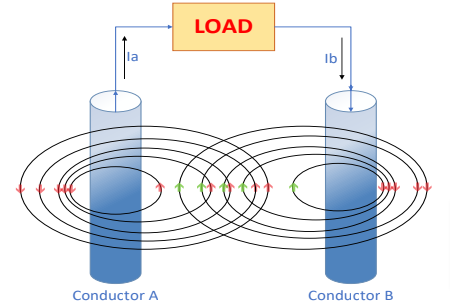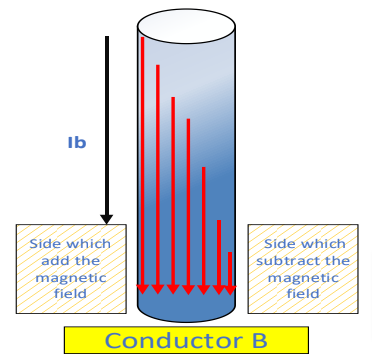In earlier tutorials, I have described the most crucial effects in the power system.
So, in this post, we are going to study the causes of proximity effect in transmission line with the help of a diagram.
What is the proximity effect in the power system?
If two conductors (i.e. A and B) are placed nearer to each other the current flowing in conductor ‘A’ produces magnetic flux linkage with conductor ‘B’. It gives rise to the flow of uneven current through the conductor resulting in an increase in the effective resistance of the conductor. This phenomenon is called as ‘Proximity effect‘.
Let, ‘Ia’ and ‘Ib’ are the current flowing through ‘A’ and ‘B’ conductors respectively. This will create the flux for itself and then they interact with each other and the resultant flux causes the non-uniformity from one side of conductor ‘B’ to the other side of conductor ‘B’.
The direction of the magnetic field around the conductor is given by the right-hand thumb rule.
The magnetic field around the conductor ‘A’ and ‘B’ is shown in the below figure.

Figure 1: Magnetic field around the conductor
This non-uniformity distribution of the magnetic field causes the uneven distribution of current and will affect the distribution of current density through the conductor.
Figure 2, gives the correct picture of the strength of the current flowing through each side of the conductor.
Due to this non-uniformity, the current through a particular conductor gets disturbed. So, the effective area of the current path decreases, and hence the resistance in AC is more compared to the DC system.

Figure 2: Distribution of current density
The proximity effect also depends on frequency (f), relative permeability (μr), and the distance between the conductor (d) and the conductivity (σ).
The proximity effect in the power system is more in underground cable as compared to the overhead transmission line as the distance between the conductors in the underground line is minimum.
Due to this effect, the insulation requirements in AC are more than DC Systems.
This is all about the proximity effect. If you have any queries or doubts, you can ask me in the below comment section.
Read more related tutorials: